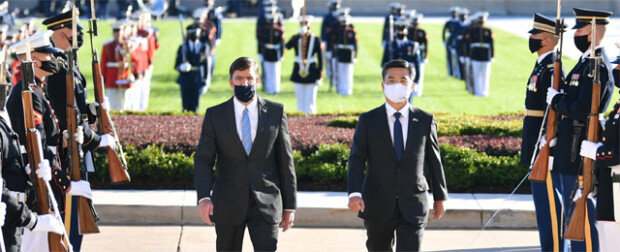ROK-US alliance must be top priority for Korean diplomacy
ROK-US alliance must be top priority for Korean diplomacy
Posted October. 16, 2020 07:45,
Updated October. 16, 2020 07:45

“The burden shouldn’t fall unequally on American taxpayers. We will reach a Special Measures Agreement as soon as possible for the stable stationing of U.S. forces on the Korean Peninsula,” said U.S. Defense Secretary Mark Esper in the opening speech at the Security Consultative Meeting (SCM) in Washington, D.C. on Thursday. His remarks hint at the possibility of pegging the matter of reducing U.S. forces in Korea to the results of burden-sharing agreement. Unlike last year, the phrase of “maintaining the current level of the U.S. military personnel in the ROK” is missing in the joint communiqué.
This year’s SCM saw a slew of differences of opinion between the two sides. While Seoul argues that there was no discussion on the size of U.S. forces in Korea, there are certainly some signs that Washington is willing to use the reduction of USFK as leverage to pressure Seoul to pony up more money. Replacing the vow to “maintain the current level of U.S. military personnel” is a new phrase noting “the current lack of a Special Measures Agreement (SMA) could have lasting effects for Alliance readiness.”
Transition of wartime operational control was another area of cacophony. Korean Defense Minister Seo Wook called for the early arrangements of transition conditions, but Secretary Esper said it would take some time to meet the conditions. This year’s joint communiqué states that the “conditions must be fully met” before the wartime OPCON is transitioned.
A spokesperson of the U.S. Department of Defense said deciding a specific timeline for transition could “jeopardize the people and the soldiers” of the two nations. It was a clear rejection for the Korean government, which wants an early transition of operational control.
It had been predicted that the differences of opinion about the terms of burden sharing or OPCON would eventually prompt an outright withdrawal or reduction of the U.S. forces in South Korea. Indeed, it didn’t make much sense for Korean military to expect to get back the wartime operational control when the basic conditions for stable stationing and training are ill-prepared. Furthermore, in the mind of U.S. President Donald Trump, the agendas of USFK and burden-sharing deal are strategically intertwined with the nuclear talks with the North.
The U.S. presidential election is only less than 20 days away. An instant agreement or a dramatic solution won’t be achieved overnight. Now is the time to concentrate our diplomatic resources to iron out any differences with Washington and prevent the uncertainties of American politics aggravating the friction the two allies are experiencing at the moment. Seoul must not forget the fact that ROK-US alliance remains top priority regardless of the results of the November presidential election.
klimt@donga.com







